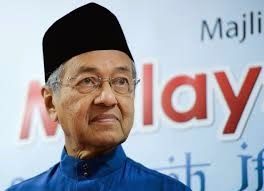Working with Mahathir: The right thing to do?

The Declaration has already been signed. What must be done now, is to insist that any change includes the institutional changes demanded in the Declaration.
Yu Ren Chung, The Malay Mail Online
Earlier this week, a group of influential Malaysians signed a “Declaration” calling for Prime Minister Najib Razak to be removed and for institutional reforms.
This is a major escalation in the effort to remove Najib, and an extraordinary development in Malaysian politics. Najib has faced months of exposés, investigations, and rebukes for corruption relating to the 1MDB scandal.
The signing of the Declaration is the first time that Najib’s critics from opposing sides have explicitly united against him. Opposition leaders and civil society figures on the one hand, and disaffected members (and ex-members) of Najib’s own party on the other hand, have put their differences aside to “save Malaysia”.
Opposition and civil society leaders who signed the declaration are still “coming to terms” with working alongside Dr Mahathir Mohamad, the leading figure of the Declaration effort, who they opposed for decades for his authoritarianism during his Premiership. Many supporters of opposition and civil society leaders have been left questioning this cooperation.
Is working with Mahathir the right thing to do? I believe this question consists of two elements. The first element is strategy, and the second element is morality. I will not present a definitive conclusion for either element, but I hope to highlight what I think are the main arguments for both.
Strategy
Firstly, is working with Mahathir strategically sound? I suggest that the answer depends most heavily on one consideration. The consideration is not just whether the cooperation will remove Najib, but instead whether it will change institutions.
Why institutions?
You may think that ousting Najib is so important, that any other consideration is secondary. This is a risky position to take. As Prime Minister, Mahathir distorted Malaysia’s institutions. Accountability mechanisms were weakened, while Prime Ministerial powers were strengthened. When Mahathir stepped down in 2003, many were optimistic that things would be different under new leadership. Instead, Abdullah Badawi attempted reforms but was unsuccessful, and Najib further exploited the distorted institutions.
Here’s one example to illustrate the point. As Prime Minister, Mahathir increasingly “personalised” the police force, the most important enforcement institution in the country. The police force became less of “a neutral regulatory regime” and more of a “personal instrument” of the Prime Minister (as described by Lee & Nesadurai in a chapter in the 2010 book, Political Change, Democratic Transitions and Security in Southeast Asia). Fast forward to the present: the very same police force ignores police reports against Najib, and instead arrests the individual who lodged the reports. The man (Mahathir) left, but the institution remained.

